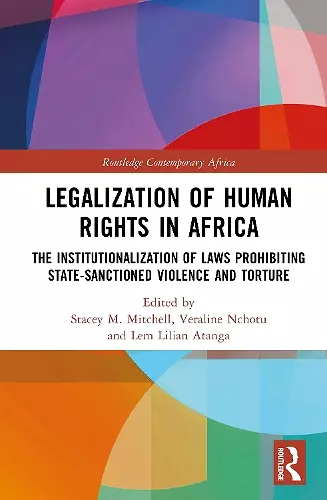Legalization of Human Rights in Africa
The Institutionalization of Laws Prohibiting State-Sanctioned Violence and Torture
Stacey M Mitchell editor Veraline Nchotu editor Lem Lilian Atanga editor
Format:Hardback
Publisher:Taylor & Francis Ltd
Published:2nd Jun '25
£145.00
Supplier delay - available to order, but may take longer than usual.

Most countries on the African continent have ratified or acceded to several human rights treaties, including the Torture Convention and the African Charter on Human and People’s Rights. This book assesses the progress African countries have made in institutionalizing human rights laws prohibiting torture, extrajudicial killings, and disappearances domestically.
States ratify human rights treaties for a variety of reasons. Some commentators defend an honest sincerity of purpose, whereas others might point to material incentives. The contributors to this volume go beyond the ratification puzzle to instead reframe legalization according to Lon Fuller’s conceptualization of congruence. Congruence is an interactive variable that measures the continuous efforts of government and the public to shape the law and its implementation. By reframing legalization as an ongoing process, the model created by the authors is used to test several hypotheses about what impacts legalization in Africa more broadly, and in countries such as Mali, Cameroon, Botswana, Zimbabwe, and Tunisia, more specifically. The contributors to this volume demonstrate that the legalization of human rights is never a finished product, but is a moving target influenced by exogenous and endogenous phenomena.
This volume is useful for researchers of genocide, human rights, and atrocity prevention, as well as for those interested in legalization and democratization both within Africa and other regions of the world.
“Using cross country comparisons, this thought-provoking book captures the complexity of domestic legalization processes, offering new insights on the importance of civil society actors to lawmaking and law implementing processes. The book makes important contributions to the literature of human rights development in Africa and the legalization of human rights law in political science.”
Carrie Booth Walling, Professor of Political Science andDirector of the Human Rights Program, University of Minnesota, USA
“This volume is a welcome addition to the growing scholarly literature on the challenges facing efforts to institutionalize human rights laws prohibiting state sanctioned violence in Africa. The editors, Stacey Mitchell, Veraline Nchotu and Lem Lilian Atanga, and the contributors to this analytically insightful and empirically grounded project critically examine the concept of legalization using Lon Fuller's criterion of congruence. Challenging traditional understandings of legalization in the IR literature, they argue that it should be understood as an interactive process which impacts and is impacted by those involved in the processes of domestic lawmaking and accountability. According to them, the real test in assessing the domestic legalization of human rights is "the extent to which lawmaking and accountability processes are fair and inclusive." Providing a more comprehensive understanding of the factors that enable and hinder the domestic legalization of international human rights laws has important implications for the work of scholars and practitioners focusing on violence prevention in a region in which several countries are at risk for mass atrocity crimes.”
George Andreopoulos, Professor of Political Science and Criminal Justice, City University of New York, USA
ISBN: 9781032749495
Dimensions: unknown
Weight: 680g
280 pages